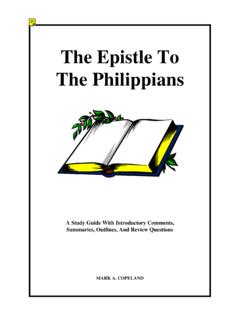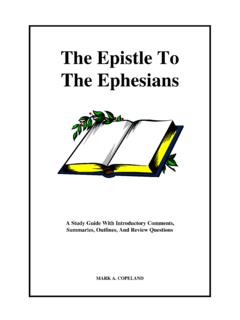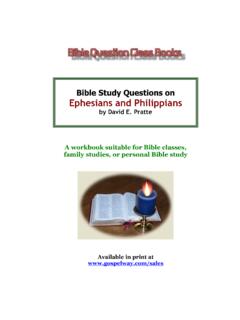Transcription of sample exegesis paper Philippians
1 sample - exegesis paper 1 sample exegesis paper : Gain or Loss - Philippians 3:7-8 *this paper was written when I was a seminary student back in 1998-2000. As such the references were only current at the time of writing. At the time this paper was written, I had done some Greek, and in this paper , I was required to demonstrate some knowledge of Greek. Please note that if you have not done any Greek, I do not expect you discuss some of the Greek syntax. I also do not expect that you do translation or sentence diagraming as I had done in this paper . Introduction In Phil 3:7-8, Paul discusses his understanding and experience of the ultimate aim of the Christian life which reflects the radical change of his attitude toward his perception of values in life. What makes Paul assume such a drastic complete turn around where he sets a negative evaluation of his prior way of life against a positive description of his new experience ?
2 1 A closer examination of 3:7-8 shows that these two verses are closely connected to the rest of chapter and constitute the main body of the letter. 2 After updating the Philippians his circumstances (Chap. 1), Paul proceeds to address the problems within the congregation (Chaps. 2-4). In Chap. 3, Paul continues to unfold one of the purposes of writing to the Philippians by sharing his concern for the influence of the Judaizers upon them. Although he has previously dealt with this issue, he now repeats his admonition so that it could be a safeguard for (the Philippians ) (3:1). After introducing the section and warning his readers concerning the false teachers (3:1-3), Paul proceeds to show that his background is not only without any cause for boasting but far exceeds the status and qualifications of the Judaizers (3:4-6). However, Paul immediately changes his tone by considering his credentials as nothing in contrast to the gain he receives by knowing Christ (3:7-11).
3 With Christ as his focus, he now presses on toward the ultimate goal (3:12-21). Paul writes these concerns so that he could set himself as an example that 1 Moises Silva, Philippians , BECNT (Grand Rapids: Baker, 1992), 179. 2 Gerald Hawthorne, Philippians , Vol. 43, WBC, CD-ROM (Dallas, Word, 1998). sample - exegesis paper 2 the Philippians could follow (3:17) and by doing so, they would stand firm in the Lord (4:1) and be united (2:1-11; 4:2-3). The passage of 3:7-8 divides nicely into three sections as Paul unfolds his argument. He begins by reexamining what he previously cherishes as gain and worth. He subsequently continues by reevaluating how he now considers all his past achievements to be a loss. Finally, Paul brings his argument to a climax by reorienting his ultimate goal in life to gain Christ.
4 Paul s Re-Examination Of His Past Gains (3:7a) Paul begins this section with a reassessment of the worthiness of the advantages that he possesses. 3:7, the pivotal verse 3, serves as the thesis statement of the entire Chap. 3 and explicitly contrasts all the human credentials that he has just mentioned (3:4-6) as detraction from the Christian true focus of gaining Christ (3:8-11). There is textual uncertainty of the introductory coordinate conjunction avlla. in 3 If avlla. is subsequently inserted by copyists to smooth the text, then Paul begins this section with striking asyndeton as a continuation of the stylistic feature that he employs in 3:4b-6 and this adds force into what he is going to declare:5 a[tina h=n moi ke,rdh( tau/ta h[ghmai dia. zhmi,an All those privileges and advantages highlighted in 3:4b-6 that Paul used to enjoy and made him proud are no longer ke,rdoj but are considered zhmi,a.)]]
5 He therefore sets before the Philippians a startling 3 John B. Polhill, Twin Obstacles in the Christian Path Philippians 3, RevExp 77(1980), 363. 4 A detailed discussion on the text critical study of avlla. is attached in Appendix A. 5 There is undoubtedly a marked transition in the passage and Gordon Fee, Paul s Letter to the Philippians , NICNT (Grand Rapids: Eerdmans, 1995), 315 comments that the effective nature of the in the expectation of a contrastive particle (supplied by the later scribes). The effect of asyndeton is also seen in the way Paul lists his credentials in 3:4b-6. Without using any conjunctions, Paul is able to bring out the force of the terseness of his personal testimony. This stylistic feature continues into 3:7. sample - exegesis paper 3 re-evaluation of values and Hawthorne is most probably right to say that any conjunction, however strong, may serve to only weaken the radicalness of this change in his outlook.
6 6 What exactly is Paul referring to with the indefinite relative pronoun a[tina? Some commentators draw a distinction between the indefinite relative pronoun and the definite relative pronoun, a[, suggesting that a[tina carries the meaning things which are of such a kind and does not specifically refer to the list of credentials in 3 However, such a distinction between o[j and o[stij is often neglected 8 in the NT. As such, there is no necessity to distinguish the nuances in the use of the indefinite and definite relative pronouns since the antecedent that a[tina refers to is definite, referring to the list of credentials that Paul specifies in 3 The list of seven personal credentials is certainly impressive and is one of the most remarkable personal confessions that the ancient world has bequeathed to us .10 Paul s pedigree can be classified into two categories as depicted in the flowing chart: Inherited Privileges (3:5a-c) Personal Achievements (3:5d-6) peritomh/| ovktah,meroj On the eighth day in respect of circumcision kata.]]]]]]
7 No,mon Farisai/oj According to the law, a Pharisee evk ge,nouj VIsrah,l Of the nation of Israel kata. zh/loj diw,kwn evkklhsi,an According to zeal, a persecutor of the church fulh/j Beniami,n Of the tribe of Benjamin kata. dikaiosu,nhn evn no,mw| geno,menoj a;memptoj According to righteousness which is in the law, 6 Hawthorne, Philippians , CD-ROM. 7 So F. W. Beare, The Epistle to the Philippians , BNTC, 3rd Edition (Great Britain: Arrowsmith, 1973), 110; J. B. Lightfoot, St. Paul s Epistle to the Philippians , (Grand Rapids: Zondervan, 1953), 149; H. C. G. Moule, Philippians Studies: Lessons in Faith and Love from St. Paul s Epistle to the Philippians (London: Hodder & Stoughton, 1897), 163; Alfred Plummer, A Commentary on St. Paul s Epistle to the Philippians (London: Robert Scott, 1919), 72; Frank Thielman, Philippians , NIVAC (Grand Rapids: Zondervan, 1995), 170 and Marvin R.
8 Vincent, The Epistles to the Philippians & to Philemon, ICC (Edinburgh: T&T Clark, 1897), 99. 8 Maximilian Zerwick, Biblical Greek (Rome: Editrice Pontificio Istituto Biblico, 1963), 68. Daniel Wallace, Greek Grammar Beyond the Basics (Grand Rapids: Zondervan, 1996), 344 also supports this view where not infrequently, o[stij seems to function just like o[j in the NT in that it has a definite referent in view. In such places, there is little or no discernible difference in the force of the two pronouns . 9 So William Hendriksen, Exposition of Philippians , NTC (Grand Rapids: Baker, 1962), 161; Robert Johnstone, The Epistle to the Philippians (Grand Rapids: Baker, 1955), 255 and Ralph Martin, Philippians , NCBC (Grand Rapids: Eerdmans, 1980), 129; Peter O Brien, The Epistle to the Philippians , NIGTC (Grand Rapids: Eerdmans, 1991), 384. However, Fee, Philippians , 315 believes that a[tina includes both nuances, referring to the antecedent in 3:5-6 and things which are of such a kind.]]]
9 10 O Brien, Philippians , 365. sample - exegesis paper 4 being blameless. ~Ebrai/oj evx ~Ebrai,wn A Hebrew, the sons of Hebrew. By listing his own pedigree according to the category above where the first four are inherited privileges while the last three are personal achievements, Paul may be attempting to silence his opponents since the form that he uses is somewhat reminiscent to ancient epideictic Paul, in praising himself by saying evgw. ma/llon (3:4) in comparison to his opponents, may be using the ancient oratory skills to diminish the status of his opponents by implicitly faulting them for not being his equal. 12 By doing so, Paul is effectively reducing to nothing the efforts of the Judaizers to place confidence in the flesh and therefore sets the stage to show that boasting in Christ is all that matters (3:3; 8-11).13 Paul continues to describe how he once regarded his privileges and achievements in 3:5-6 as ke,rdh.
10 This language of commerce, ke,rdoj, means gain, advantage, profit 14 and is also used as interest on By employing this metaphor ke,rdoj in the plural (as compared to its antonym, zhmi,a, which is in the singular), Paul demonstrates that he has carefully counted up all these separate items of merit like profit, conscious that when the heavenly audit occurred on the final day, his returns would be seen to be fully in order. 16 By being a legalist and placing his 11 Examples of such kinds or oratory can be seen in Cicero, Ad Herennium, 173-175; Plato, Grg, 477C; Phlb, 48E; Leg., 697B, 727A-C; Aristotle, Rh. Al. 1440b 13; Eth. Nic, , 1098b. 12 Hawthorne, Philippians , CD-ROM. 13 However, Paul is not attempting to exalt himself by recounting all his advantages because boasting about himself is distasteful as seen in 2 Cor 11:16-29 and 12:1-10 where he lists his credentials as a defense to his apostolic authority.







